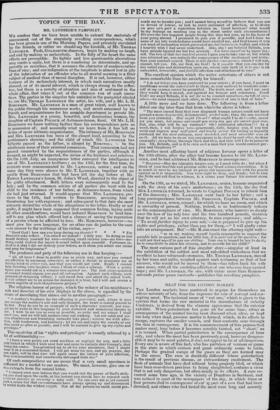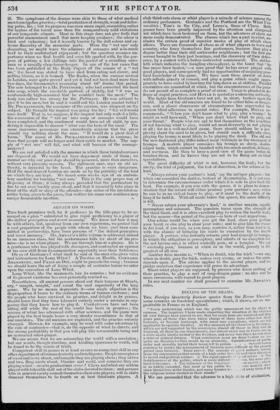MEAT FOR THE LONDON MARKET.
THE London markets have contrived to acquire for themselves an odious notoriety of late, from the exposure for sale of corrupt and cor- rupting meat. The technical name of "wet uns," which is given to the carrion that forms the raw material in the manufacture of ricketty Cockneys, is derived from the clammy appearance that the exterior exhibits. When putrefaction has gone on for some time, either in consequence of the animal having been diseased when alive, or kept too long when dead, gaseous matter is formed, which, in its efforts to escape, ruptures the smaller vessels, and their contents ooze through the skin in consequence. It is the commencement of this process that makes meat, long before it becomes sensibly tainted, eat " short," as it is termed. When partial putrefaction is the consequence of time only, and where the meat has been previously good, however disagree- able it may be to most palates, it does not appear to be at all dangerous. Every one is aware of this fact, who has partaken of venison or game in the state in which venison and game ordinarily come to table. Perhaps the gradual escape of the gases as they are formed may be the cause. The case is decidedly different where putrefaction is the result of previous disease, or extraordinary excitement The flesh of animals that have died without being properly bled, or which have been over-driven previous to being slaughtered, contains a virus that is not only dangerous, but often deadly in its effects. A case oc- curred some time ago, in the vicinity of Dumfries in Scotland, and was noticed in most of the newspapers of the day, in which three or four persons died in consequence of eat lig part of a cow that had been drowned; and others who had tasted the meat were long and severely ill. The symptoms of the disease were akin to those of what medical men term typhus gravior,—total prostration of strength, weak and falter- ing pulse, &c. ; but its progress was even more rapid, resembling rather the typhus of the torrid zone than the comparatively mild visitations of our temperate climate. Meat in this stage does not give forth that powerful ammoniacal smell that mere keeping produces; the odour is faint and sickening ; but it is easily known by the dull colour and ex- treme flaccidity of the muscular parts. Were the " wet uns" only disgusting, we might leave the admirers of sausages and a-la-mode beef to their undisturbed enjoyment; but the question assumes im- portance when we find health and even life sported with, for the pur- pose of putting a few shillings into the-pocket of a swindling sales- man or a rascally chop-house-keeper. In one of the last cases that has been published in the Daily Papers of the seizure of a " wet un," the beast was stated to have died from eating wet clover, and getting blown, as it is termed. The flanks, when the carcase arrived in London, were quite green! and yet it had not been dead more than two days, the thermometer averaging about 600 during that period. The cow belonged to a Mr. POTTINGER ; who had converted the head into soup, which the constable partook of slightly, but " it was so confoundedly high-seasoned that he couldn't taste the meat." The body was rather too strong for the Pottinger. He was advised to give it to his men, but he said it would suit the London market better! Mr. POCKLINGTON, the consignee of the carrion, was eloquent on the subject. He thought the inquest was going too far ; " the evil would cure itself." That is, we suppose, if the inquest had only waited a little, the conversion of the " wet un" into soup or sausages would have been completed, and the condiment would have set all right, by ren- dering it impossible to discern " what was the taste of the meat." The same ingenious personage was exceedingly anxious that the press should say nothing about the case. " It would do a great deal of harm." The cause of Mr. POCKLINGTON'S alarm is curious ; he fears that people will no longer send their cattle to market. The sup- ply of " wet uns" will fail, and what will become of the sausage- makers ?
We are not satisfied with the manner in which these tainted carcases are disposed of. We would not have dogs-meat made of them; we cannot see why our poor dogs should be poisoned, more than ourselves, without very pressing reasons. The righteous man, says an old au- thority, is merciful to his beast. The practice is even dangerous. Half the mad dogs of London are made so by the putridity of the food on which they are kept. We heard some weeks ago of an ambula- tory machine for burning " wet uns." This is the only proper way of disposing of them ; it being always provided that the purification by tire be not over hastily gone about, and that it invariably take place in front of the stall or shop of the offender—due notice of the intended sa- crifice being given to the press, that neither his name nor residence may



















 Previous page
Previous page